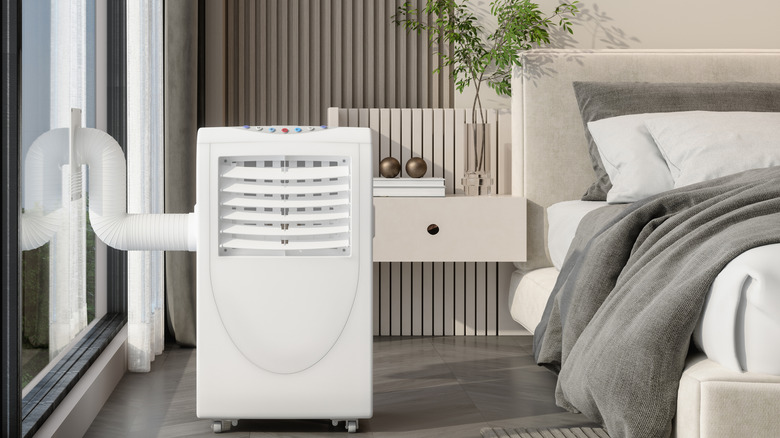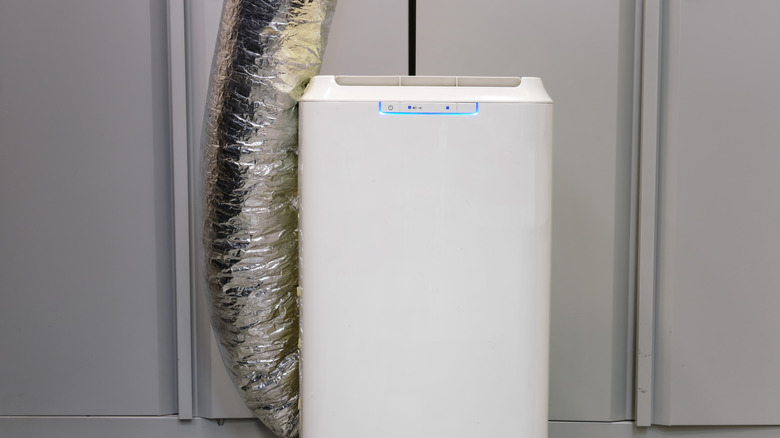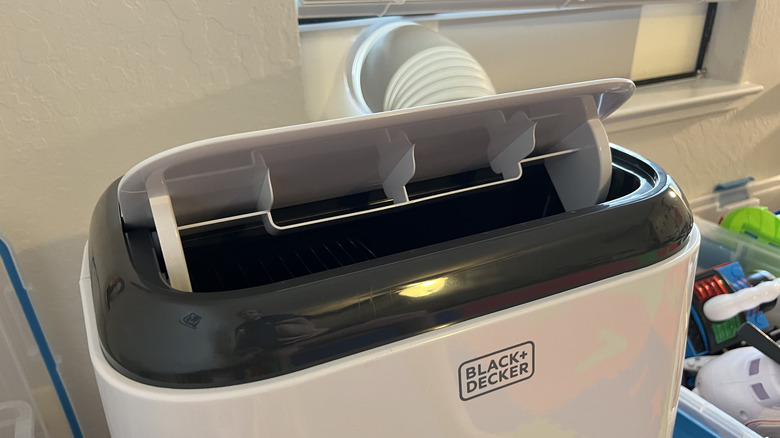Is It Worth Buying A Portable AC Unit To Get Through A Heat Wave? Here Are The Pros & Cons
Given the language we use to describe a heat wave, there's no wonder we'll go to great lengths to escape it. When the sun beats us down, we often describe the experience in terms of cooking ... we're roasting in the oven-like, searing heat. We might even occasionally compare it with famously warm places of eternal torment. Who wouldn't escape that by plopping down a few hundred bucks for a portable AC?
But are portable air conditioning units, often purchased to boost your central air for the hottest days of the year, really your deliverance or just a deal with the devil? The answer, as usual, depends on your expectations and your budget. You can make it work in the right room, so long as you're more concerned about comfort than about high power bills. But there will be compromises.
One of those compromises, strangely, is portability. When most people talk about portable air conditioners, they mean large freestanding units that are usually tethered to a window with one or two largish vent pipes. That ductwork effectively takes the portability out of the portable AC since you can't stray too far from an escape route for the heat it produces. Sometimes people describe evaporative coolers as portable air conditioners, and, while they are certainly portable, they only work well in very dry climates. Also known as swamp coolers, evaporative coolers store heat in the water they convert from ice or water to vapor, so they don't need to be vented outdoors. But it's not the swamp we're trying to drain here, it's the lake of fire.
The pros and cons of portable AC units
Portable air conditioners deliver traditional heat exchange technology in a small unit with casters, which is where the portability claims come in. These self-contained wonders cool air (from either inside the room or outdoors) and dump the air that's heated in exchange out the window. They're easy to install and maintain, and they're mobile, at least at first. You have a lot of flexibility in where you use a portable unit, as long as there's a way to vent it outdoors. They come in a variety of prices and sizes, usually expressed in British thermal units (BTUs), so you can dial in exactly what you need. At least on paper, portable ACs excel at doing exactly what you want them to do.
There are some downsides, though. Portable units won't work well unless they're properly sized for the space you're trying to cool. They're also inefficient than other types of air conditioning, which can result in higher-than-necessary power bills. They tend to be loud, and because they require access to the outside, you don't have complete control over where the noise is. Some units require a condensate drain line or a storage reservoir that you periodically empty. And many have trouble effectively cooling large rooms or spaces with open floorplans; they tend to cool the nearby area and then turn off their thermostats, leaving the area across the room a bit warm. There are other problems as well — a relatively short lifespan, maintenance requirements, and a tendency toward mold growth. While portable air conditioners are generally safe, the fact that you're probably undermining your window's locks to exhaust the unit can be enough to steer some people away from portable ACs.
Comparing portable ACs with alternatives
When you compare portable ACs with the other types of air conditioning units, you begin to really feel the urge to back slowly away from the portable air conditioning department. Compared with central air conditioning, portable units don't bring much to the table ... other than radically lower costs initially. Central AC cools your whole home, works better in large spaces, and increases your property's value. But remember that portable ACs usually complement central air rather than replacing it.
While it might not address all your questions about picking the right AC unit, a more apt comparison is with window ACs. Window units can be more difficult to install, but they are usually more efficient, quieter, cheaper, and less intrusive in your floor space. When comparing window and portable units at a major big box hardware store, window units perform far better in terms of efficiency (expressed as a Combined Energy Efficiency Ratio, or CEER, rating), averaging a CEER score of 11.8 (higher is better), versus 8.0 for portable ACs.
One Toshiba portable AC held its own with a 12.3 CEER score. But while its cost per BTU was the second lowest of all the portable units, it was still higher than that of most window models. It also had a relatively poor cost per unit of efficiency. So, unless you are saddled with an HOA that prohibits window units, you'll generally be better off with one of those instead. Sure, it might diminish your view, but the inferno isn't known for its scenery.


